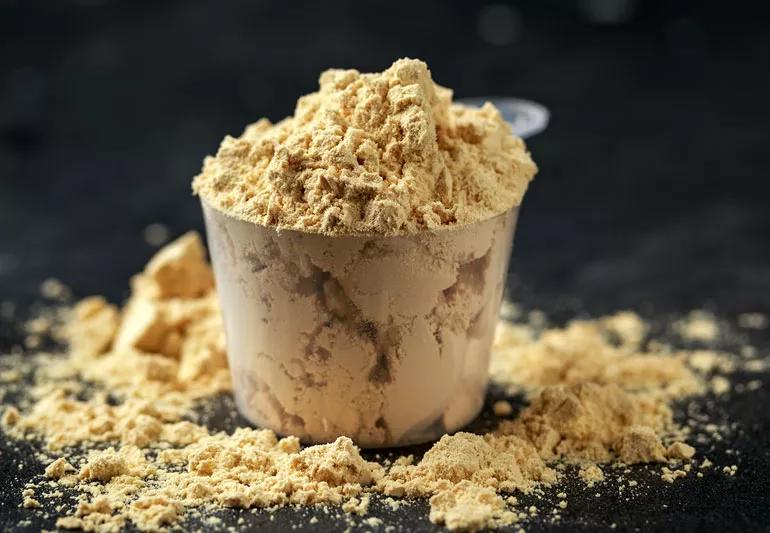An expert explains the type of pea proteins and the benefits

Image content: This image is available to view online.
View image online (https://assets.clevelandclinic.org/transform/814184db-7bb6-4456-81b1-eb8a0c1c38b5/peaProteinPowder-1300808754-770x533-1_jpg)
pea protein powder
If you’re looking to get a little extra protein in your diet, you might want to consider an option that’s garnered a lot of positive attention lately: pea protein.
Advertisement
Cleveland Clinic is a non-profit academic medical center. Advertising on our site helps support our mission. We do not endorse non-Cleveland Clinic products or services. Policy
Yes, pea, as in the vegetable. But don’t laugh; there’s a good reason it makes sense as a supplemental part of a well-balanced diet. To learn all about the benefits of using pea protein, we talked to registered dietitian Anthony DiMarino, RD, LD.
Protein is one of the building blocks of food, a nutrient that gives food its structure, says DiMarino. Protein itself is made up of amino acids and protein from yellow peas contains easily digestible ones.
“The amino acids are extracted and create a powder which anyone can use as a supplement to a well-balanced diet,” he adds.
There are three types of pea protein products, all of which are made from the yellow split pea, according to DiMarino.
Advertisement
As DiMarino suggests, the type of pea protein that’s right for you depends on your needs.
“One cup of yellow peas on their own contains about 8 grams of protein,” says DiMarino. “But one scoop of pea protein isolate — the protein powder you’d buy at a store — contains between 15 and 20 grams of protein for every 100 calories.”
To put that in perspective, the recommended dietary allowance of protein for an adult is about 0.8 grams per kilogram of your body weight. For example, a 175-pound person would need about 63 grams of protein a day. If you’re active, you’ll need a little more.
In other words, pea protein powder packs a powerful punch, particularly as a dietary supplement.
Several potential benefits can come with using pea protein, Dimarino says, including:
There aren’t many drawbacks to pea protein, notes DiMarino, as long as you properly incorporate it into your diet. Essentially meaning, it should be a supplement, not a substitute for real food. “Remember the food-first approach and treat pea protein as an additional part of your daily intake, not in place of something else,” he says.
When deciding between pea protein and another type, DiMarino says one thing to keep in mind is, “It’s not that one is better than another. It just depends on what you’re looking for and what trade-offs you’re OK with.”
Whey protein is the most popular of protein mixes, he continues, for a few reasons. First, it’s easily absorbed by your body. It’s also more affordable than other proteins, which can be a factor for many. And it’s pretty similar to pea protein. “When you look at the nutrients whey protein has, it’s pretty similar in terms of proteins, fats and carbs,” he adds.
One primary difference is that whey protein has lactose. Also, while both whey and pea protein are naturally gluten-free, many whey protein powders are made with additives that contain gluten. Pea protein powders are less likely to contain gluten additives, but they still can. If you’re avoiding gluten, check the packaging of any protein powder you buy to ensure it’s certified gluten-free.
Advertisement
The only other difference worth noting is that pea protein contains more iron than whey, while whey has more calcium and potassium. “When it comes to choosing, it just depends on what you’re looking for,” DiMarino says, “because they’re pretty similar when you compare macronutrients.”
Pea protein can be a great, healthy choice for getting supplementary protein. But as DiMarino advises, just remember to use it in addition to a well-balanced diet and not as a substitute for any meal or other food.
Advertisement

Sign up for our Health Essentials emails for expert guidance on nutrition, fitness, sleep, skin care and more.
Learn more about our editorial process.
Advertisement
Pick bell peppers to help fight cancer, memory decline and joint pain
The tropical fruit is a good source of antioxidants and vitamin C
High amounts of cholesterol and saturated fat in red meat may be linked to heart disease
The leaves and pods from this tree are rich in essential nutrients
This starchy root vegetable is a staple in many global cuisines — but it has to be prepared correctly, or it can cause serious concerns
These delicate green sprouts can give you an extra dose of vitamin K and other nutrients — but they’re not safe for everyone
Edamame, lentils and chicken breast are good sources of protein
Eating this root vegetable can help support your eye, heart and brain health
Although it could be used as a moisturizer, this new trend is not recommended
Communicating clear limits helps protect your time, energy and emotional well-being
High cholesterol can be genetic, but testing and treatment can lower your heart disease risk